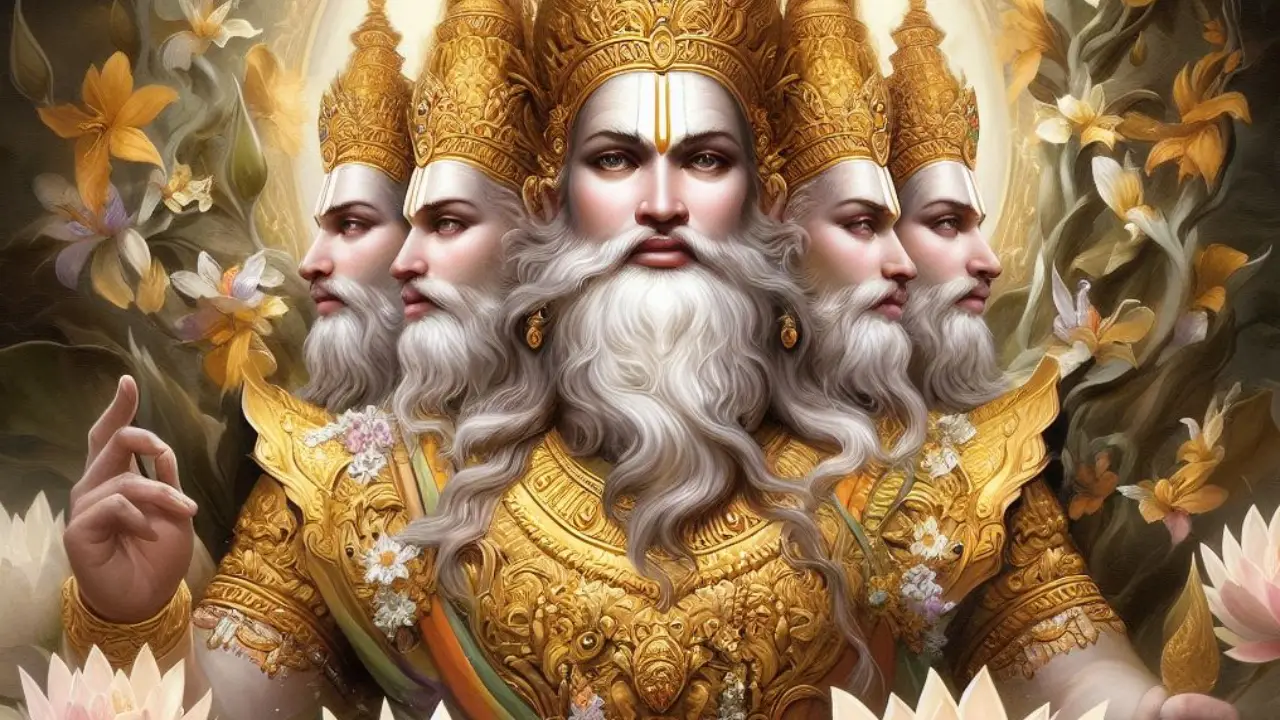Within the intricate tapestry of Hindu deities, Lord Brahma commands a pivotal role as the universe’s creator, embodying the divine essence that forges existence. Yet, even amongst gods, the trappings of human fallibility can weave their way. The chronicle of Lord Brahma’s fifth head, a quintessential lesson in the perils of arrogance, stands as an eternal testament to the pitfalls of unchecked ego and the cost of unbridled ambition.
The Divine Genesis
Brahma, entrusted with the formidable task of sculpting the cosmos and all its myriad life forms, bore the responsibility with his four heads, each aligned with a cardinal point. His watchful gaze ensured a celestial equilibrium, the cornerstone of the universe’s delicate harmony. But as time unfolded, Brahma’s boundless desire for dominion beckoned.
Emergence of Lord Brahma’s Fifth Head
Amidst the cosmic order, Brahma’s yearning for supremacy and an unquenchable thirst for power propelled him into a realm of self-aggrandizement. This realm saw the emergence of a fifth head, a grotesque embodiment of his towering arrogance. This newfound appendage, far from a symbol of might, embodied the unchecked ego that now threatened to unravel all that Brahma had once held dear.
Revealing the Repercussions
Yet, this fifth head heralded not the desired dominion, but a realm of disorder and turmoil. Brahma’s unyielding hubris eclipsed his divine duties. As his gaze turned inward, his stewardship over creation waned. And the very universe he had woven with care began to spiral into a maelstrom of chaos. It was a reflection of the tumult that ravaged the core of Brahma himself.
The Divine Intercession: Shiva and Vishnu
Witnesses to the disarray that Brahma’s arrogance had wrought, two other eminent deities, Lord Shiva and Lord Vishnu, intervened. Their celestial stature notwithstanding, they recognized the pressing need for rectification. Shiva, renowned for his asceticism, communicated his stern disapproval of Brahma’s unchecked conceit. Vishnu, the eternal preserver, emphatically extolled the virtues of humility in fulfilling one’s divine obligations.
Brahma’s Humble Subjugation
The fifth head that once symbolized Brahma’s arrogance necessitated taming. In an awe-inspiring tableau of divine intervention, Shiva’s incandescent gaze severed the aberrant appendage from Brahma’s corporeal form. This vivid spectacle allegorically underscored the criticality of separating ego from the soul. It was an indispensable step towards rekindling the cosmic balance that had been compromised.
Extracting the Lesson from Lord Brahma’s Fifth Head
Brahma’s tribulation did not transpire in vain. The fifth head’s excision bestowed upon him an indelible lesson in humility. A humbling realization permeated his consciousness: no entity, celestial or earthly, could elude the ramifications of unbridled arrogance. This epiphany impelled Brahma to once more embrace his cosmic role. He wielded his creative power with a newfound equilibrium and tempered sense of purpose.
Symbolism of Lord Brahma’s Fifth Head Echoing Through Hindu Philosophy
Beyond its mythological semblance, the fifth head narrative resonates as an allegory reaching far into the recesses of Hindu philosophy. It encapsulates the perils of pride and the fragility of power. Within the tenets of this ancient philosophy, it serves as a resounding reminder that even the most puissant beings must remain tethered to humility. This is because the absence of humility may unravel the very tapestry of cosmic order.
Contemporary Resonance
The saga of Brahma’s fifth head reverberates through the corridors of contemporary society. In an epoch marked by unprecedented technological strides and societal advancement, the lessons encapsulated within the annals of humility and equilibrium have never been more germane. As individuals and societies traverse the terrain of escalating influence and authority, the cautionary account of Brahma’s descent due to hubris resounds. This serves as a timeless, universal admonition.
Conclusion
In the continuum of time, the legend of Lord Brahma’s fifth head remains an enduring parable. It is a harmonious melding of mythos and morality. It proffers an evergreen counsel that even the loftiest beings may stumble in the labyrinth of their own arrogance, hurtling towards their own undoing. As the fifth head’s excision symbolized the separation of ego from the essence, so too does it underscore that humility is the fulcrum upon which existence’s harmonious dance pivots. In an epoch that lionizes power and conquest, Brahma’s cautionary tale is a resonant reverberation that underscores the significance of equilibrium and humility in every sphere of life.

